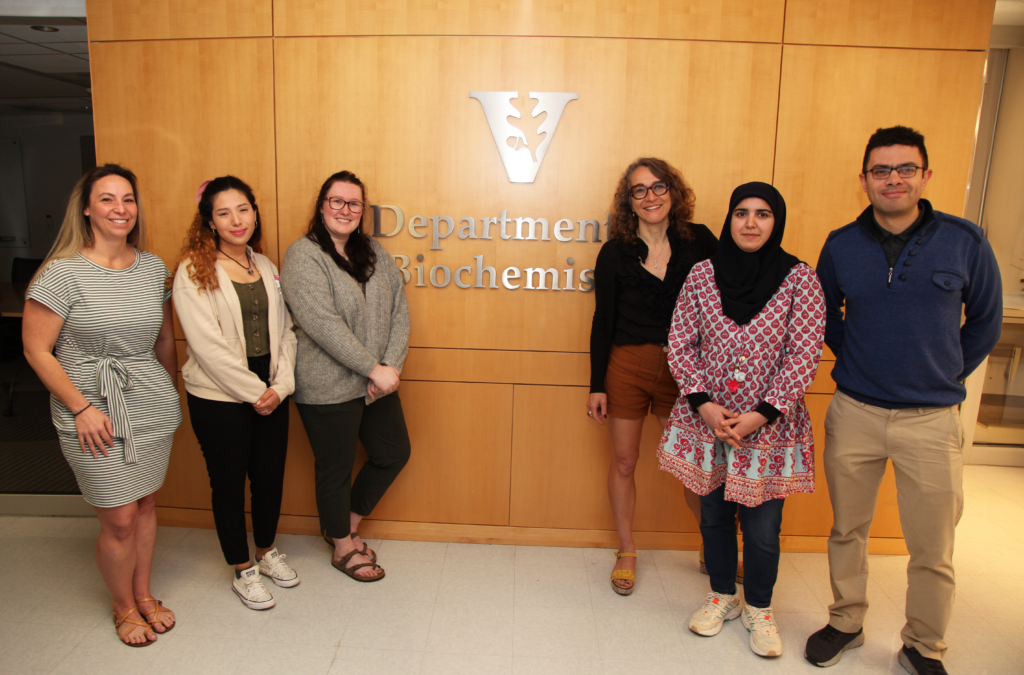
Katrin Karbstein has joined the School of Medicine Basic Sciences as Ingram Professor of Cancer Research and professor of biochemistry . She has also been appointed co-leader of the cancer cell biology program in the Vanderbilt-Ingram Cancer Center. There, she will develop and implement program aims, participate in strategic decision making in the cancer center, direct pilot project funding, facilitate interactions amongst cancer center members, and assist in the recruiting activities for the 42-member program with over $11.7M in annual peer-reviewed funding.
Karbstein is a highly accomplished and recognized leader in understanding how ribosomes are assembled, a process critical for the translation of the genetic code into the protein molecules—a fundamental process for all organisms. She has made a series of impactful discoveries describing how these large protein synthesis machines are assembled, defining functions of ribosome quality control factors, and understanding how misassembled ribosomes generate developmental disorders and cancer, according to David Cortez, Richard Armstrong Professor for Innovation in Biochemistry and chair of the biochemistry department. Karbstein was the first to describe a ribosome repair pathway in which damaged ribosome subunits could be swapped out with new subunits, thus preserving function of the large machine without having to start over and assemble it from scratch.
“We warmly welcome Dr. Karbstein to Vanderbilt,” Provost and Vice Chancellor for Academic Affairs C. Cybele Raver said. “Her expertise in ribosome biology and dedication to mentorship will undoubtedly enrich our academic community and advance scientific discovery at the highest level.”
Karbstein serves on the board of directors of the RNA Society. In addition, she has served on many grant review panels, including the National Institutes of Health MGA and Maximizing Investigators’ Research Award A study sections and serves on the prestigious Damon Runyon Fellowship Award committee. She is also on the editorial board of the journal RNA and an editor for ACS Chemical Biology. Within her previous institutions, Karbstein has chaired faculty search committees, served on graduate student admissions committees, developed undergraduate research opportunities, and served on faculty engagement committees.
“Professor Karbstein is a world leader in understanding how one of the most critical machines in life, the ribosome, is repaired and maintained in a form that allows the accurate production of the protein molecules that are essential for the workings of the cell. Her groundbreaking work on ribosome assembly and repair represent key advances in the field, and we are excited that she has chosen Vanderbilt for the next phase of her research studies,” said John Kuriyan, dean of Basic Sciences and University Distinguished Professor of Biochemistry and Chemistry. “Her commitment to guiding upcoming scientists ensures that her impact will extend far beyond her own achievements. She represents the best of what it means to be a scholar: she not only advances knowledge but also elevates those around her to do the same.”
Karbstein will come to Vanderbilt from The Herbert Wertheim UF Scripps Institute for Biomedical Innovation & Technology (formerly The Scripps Research Institute) where she was professor of integrative structural and computational biology. She was a Damon Runyon postdoctoral fellow at the University of California, Berkeley, earned her Ph.D. in biochemistry from Stanford University, and earned degrees in chemistry and biochemistry from Ruhr University Bochum and Witten/Herdecke University, respectively.

“I could not be more excited to join Vanderbilt University School of Medicine Basic Sciences and the cancer center,” Karbstein said. “The levels of faculty engagement, the resources, and opportunities for collaboration are tremendous and will provide exciting new avenues for our research.”
Karbstein’s research has been continuously funded by numerous external grant awards. These include awards from the National Science Foundation, the NIH, the U.S. Department of Defense, the American Heart Association, and the Howard Hughes Medical Institute, which named her an HHMI Faculty Scholar. Her lab is currently funded by an NIH National Institute of General Medical Sciences MIRAA award and an NSF grant.